Malcolm Turnbull caused carnage when he seized the leadership from Tony Abbott, ruthlessly overthrowing a first-term prime minister who had worked hard to achieve a landslide victory over Labor.
Turnbull’s vow on the afternoon he challenged Abbott was simple: he promised a new style of leadership, no slogans, values of free enterprise, individual initiative, freedom and cabinet consultation.
Crucially, he pledged improved polling numbers after a downward trajectory and strong economic leadership to restore business confidence.
Turnbull has passed 242 bills and 200 packages since September 15, 2015
Two years on, the question needs to be asked: What has Turnbull and his Cabinet achieved, and have they fulfilled their promise to the Australian people?
An analysis by The Daily Telegraph has found Turnbull has performed highly when it comes to education, national security, the successful passage of legislation through the Senate and international politics.
His best performers in Cabinet are Peter Dutton, Michaelia Cash, Christian Porter and, when it comes to passing legislation in the Senate, Mathias Cormann.
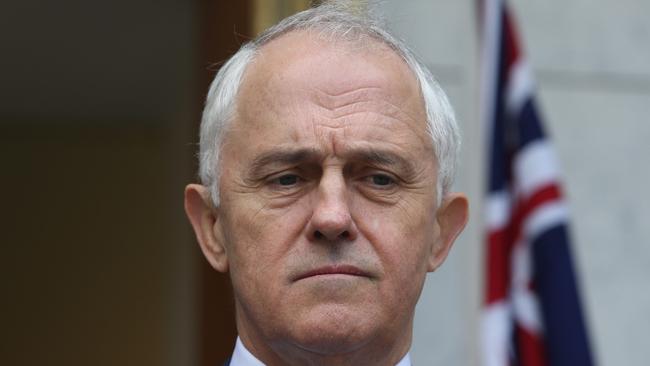
But the two core goals he articulated that afternoon in September 2015 remain unfulfilled.
While he just won the 2016 election, the polling since hasn’t shifted, with Turnbull presiding over 19 Newspoll losses to Labor under Bill Shorten.
And our debt levels are higher than ever.
Turnbull has lived up to his promise of a consultative cabinet. His leadership style is inclusive and considered, with the prime minister relying on the advice of his key lieutenants, Cormann, Dutton and Scott Morrison before making decisions, ensuring a mostly unified team.
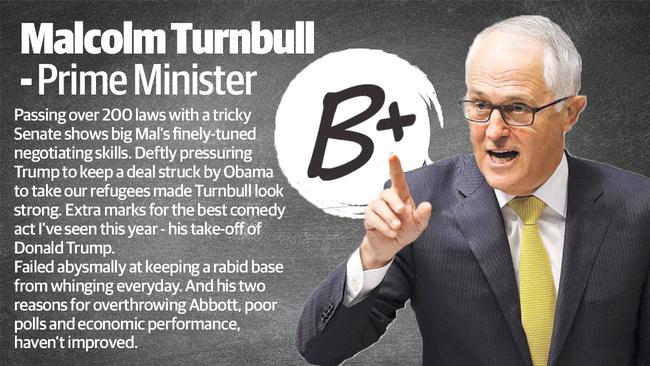
He has avoided slogans — a pledge that has proven to be detrimental as the public do not know what the Government stands for.
The public has been unable to hear any sharp, deliverable messages through his long, wordy press conferences.
Mr Turnbull has put to use his negotiating skill, mastered over a lifetime in business and the law, to secure the passage of legislation through the senate.
Turnbull has passed 242 bills since September 15, 2015, and 200 packages.
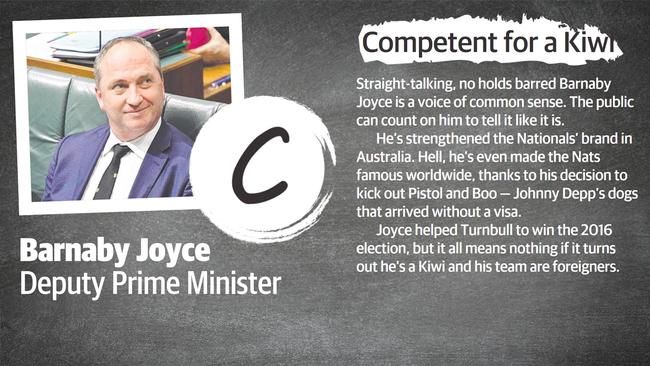
The biggest pieces of legislation he’s negotiated through the senate, in difficult circumstances, include childcare reform, the re-establishment of the Australian Building and Construction Commission, so-called Gonski 2.0 education reforms, tax cuts for small and medium businesses with a turnover of up to $50 million and media reform.
His skill is best seen in the leaked transcript of his conversation with United States President Donald Trump, where he convinces him to accept refugees from Manus and Naura, against his one election commitment.
On the international stage, he encouraged world leaders to take action on social media sites that allowed terror propaganda. He has also ensured Australia is at the centre of negotiations with Japan, the United States, South Korea and China on North Korea.
National security has been prioritised under Turnbull with creation of a Home Affairs portfolio and new shoot to kill laws to target Australian terrorists fighting overseas.
Mr Turnbull hasn’t broken any election promises, apart from his inability to get the plebiscite through the Senate.
Ironically, the economy is the Turnbull Government’s greatest weakness. With no serious attempt at budget repair, Australian debt is half a trillion dollars for the first time in the nation’s history. Annual growth is 1.9 per cent, slower than New Zealand, United States and Canada, while wages growth is sluggish. Business confidence, however, has improved with tax cuts for companies with a turnover of up to $50 million a year.
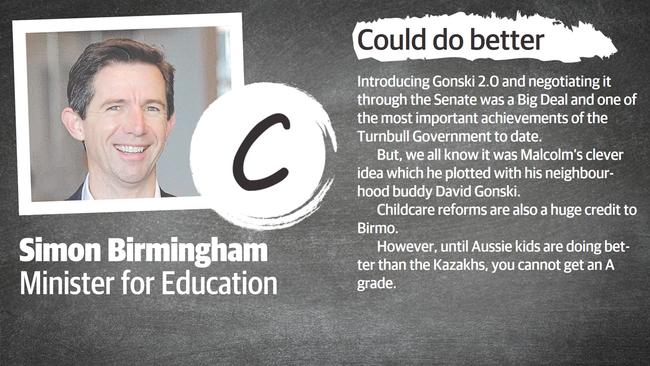
His free-enterprise values have been sidelined. The bank tax and his pressure on AGL to keep open the Liddell power station both interfered with allowing private business to operate free of state control.
With a deeply divided team, Turnbull has relied on the counsel of conservative cabinet ministers, Mr Dutton and Mr Cormann, to ensure unity. But the peace has been broken by his own moderate faction on the issue of same-sex marriage.
He also did not lift a finger to convince his old enemy Cory Bernardi to remain in the Liberal Party and now the defector spends his days convincing Liberal voters to join his rival party, The Australian Conservatives.
He faces major conflict on energy policy in the Coalition, with a Clean Energy Target and ways to bring down power prices remaining the biggest unresolved issues facing his Government.
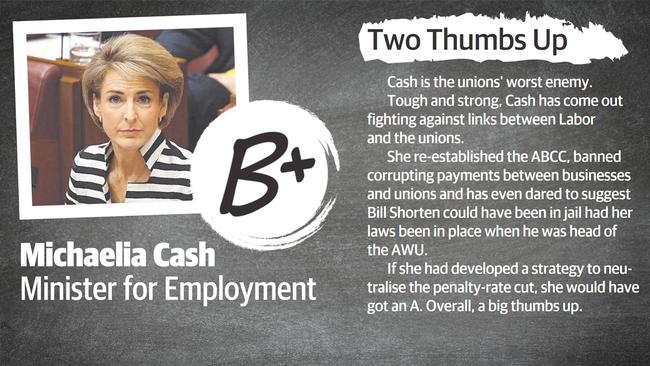
Mr Turnbull has struggled to connect with conservative Liberal voters, alienating them through superannuation policy he later reversed and a high-spending, high-taxing budget.
During the election campaign, Turnbull failed to land a blow against Shorten. As a result he won, but just by one seat, reducing the 14 seat majority from the Abbott era.
Scandals engulfing Jamie Briggs, Sussan Ley and Bronwyn Bishop along with the current citizenship crisis have also plagued his term as prime minister.
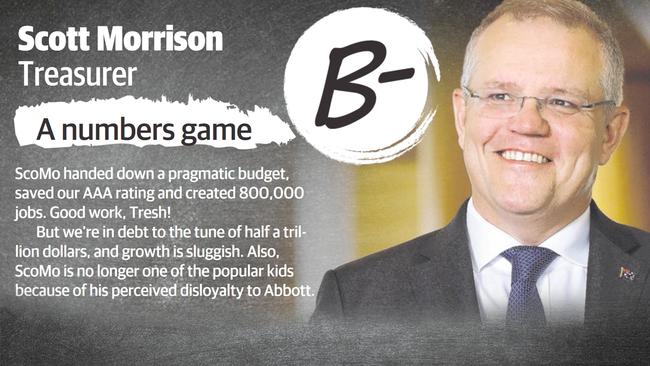
Treasurer Scott Morrison can be credited with lowering taxes for Australian businesses with turnover of less than $50 million a year, reducing unemployment rate from 6.1 to 5.6 per cent and retaining our AAA credit rating when it was at grave risk.
Turnbull’s team is governing competently but a reshuffle is desperately needed
Morrison summarised his achievements like this: “The bottom line is that more Australians are in work, businesses are investing more, exports are up, we are closer to balancing the budget now than at any time in almost a decade,” he said.
His budget this year was unpopular with the conservative Liberal base for its lack of spending restraint and the taxes slapped on the big banks.
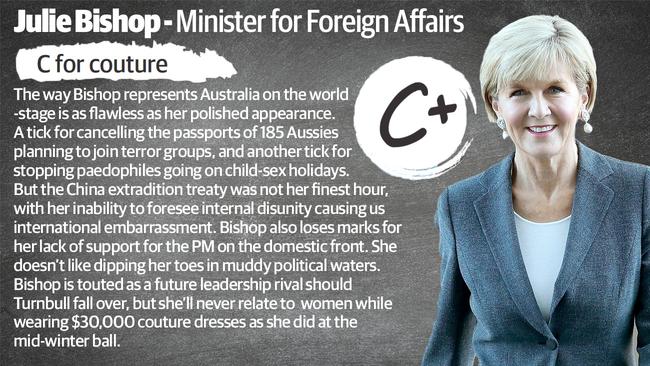
Foreign Minister Julie Bishop is expanding the diplomatic network with the creation of new embassies while preparing a foreign affairs blueprint or white paper, the first since 2003.
The worst performance on her watch was the eleventh hour failure of the China Extradition treaty, causing Australia international embarrassment and strained relations with China.
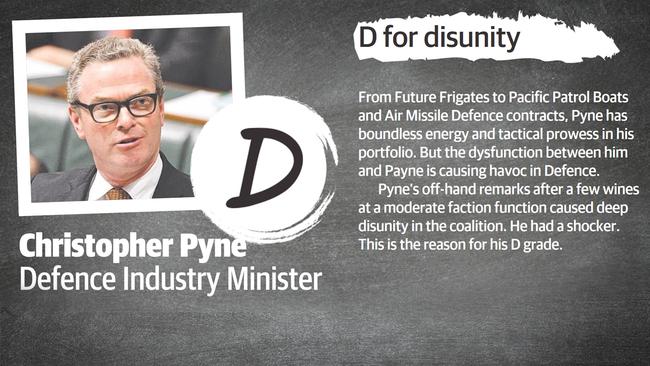
Among Turnbull’s worst-performing cabinet ministers are Attorney-General George Brandis and the Defence team of Chris Pyne and Marise Payne who are struggling to work together effectively.
Brandis has failed to prevent problematic foreign Chinese investment in critical infrastructure, with Mr Morrison stepping into block the sale of Ausgrid to a Chinese firm.
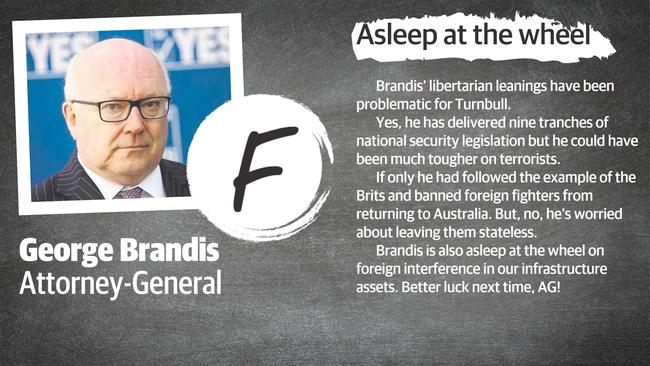
Critics say Brandis has been “asleep at the wheel” when it comes to interference by the Chinese, in particular.
He has also muted the citizenship revocation laws because of his concern around leaving terrorists stateless.
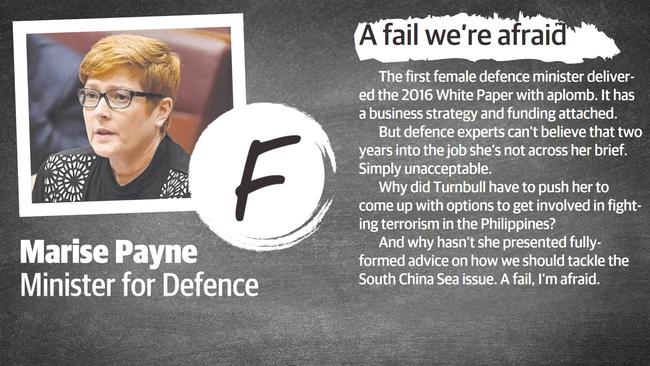
The greatest criticism of Payne is her inability to get across the brief after two years in the job.
While she has delivered the 2016 White Paper with a business strategy and funding, this was driven by Turnbull in the National Security Committee of Cabinet.
Turnbull has had to push her to come up with options to deal with terrorism in the southern Philippines and she has not presented fully-formed advice on the South China Sea.
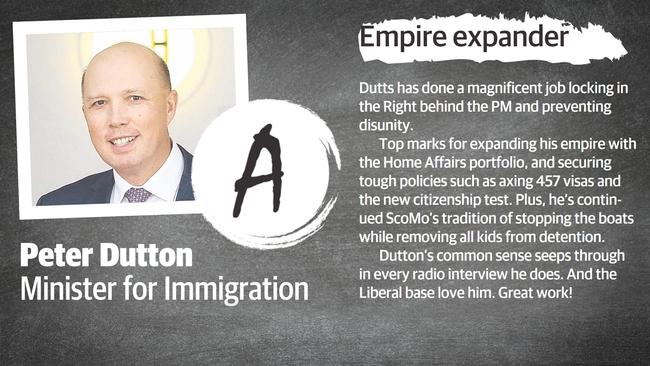
Dutton has been a standout performer, setting up a Home Affairs ministry after almost a year of discussion and consultation with Mr Turnbull. It brought together Australia’s national intelligence and domestic security arrangements to better fight terrorism.
He set up the Australian Border Force, abolished the 457 visa system to prioritise Australian workers and is proactively booting out of Australia non-citizen crims.
Mr Dutton has also played a crucial role in helping secure stability within the Liberal Party by supporting Turnbull and pushing for introduction of conservative policies.
Turnbull’s team is governing competently but a reshuffle to remove the dead wood is desperately needed.
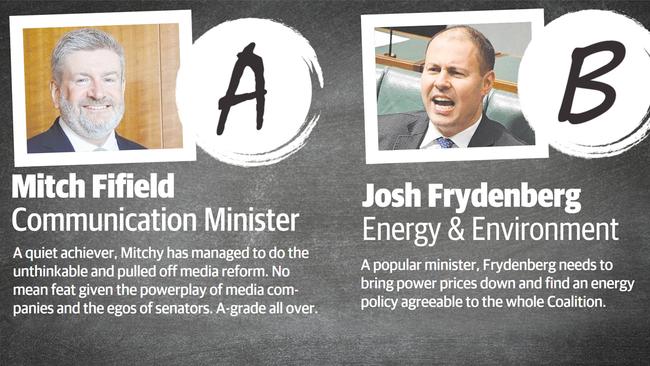
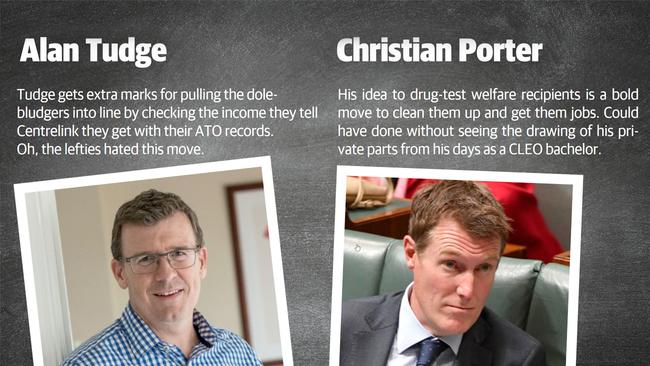

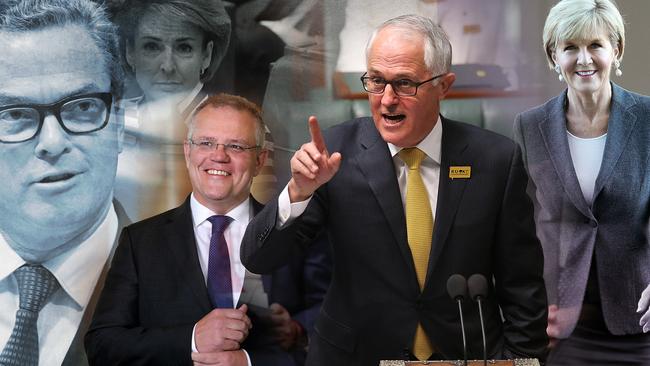
Here’s what you can expect with tomorrow’s Parramatta weather
As summer moves towards autumn what can locals expect tomorrow? We have the latest word from the Weather Bureau.
Here’s what you can expect with tomorrow’s Parramatta weather
As summer moves towards autumn what can locals expect tomorrow? We have the latest word from the Weather Bureau.